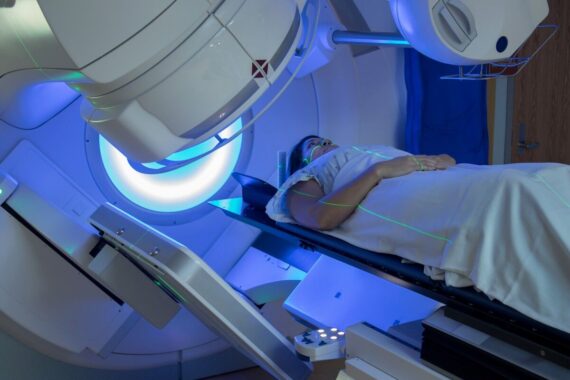NHS England expected to scrap two-week wait cancer target this week

The target for patients to be seen by a specialist within two weeks of an urgent GP referral is expected to be scrapped later this week in a move to slim down cancer standards.
Last year, NHS England ran a consultation on its proposal to ditch six of the standards in favour of the faster diagnosis standard which stipulates that cancer is ruled out or diagnosed within 28 days of an urgent GP referral.
Following this consultation, health secretary Steve Barclay is expected to sign off on these changes this week, according to The Times.
The targets NHS England will maintain are:
- Patients who have been urgently referred by their GP, have breast cancer symptoms, or have been picked up through screening should have a diagnosis (or have their cancer ruled out) within 28 days;
- Patients who receive a cancer diagnosis should start their treatment within 62 days from GP referral;
- Patients should start first treatment within 31 days of receiving a cancer diagnosis and decision to treat.
There are currently nine cancer waiting times standards which span targets on diagnosis, first treatment and subsequent treatment.
In its consultation, NHS England said the two-week wait target ‘sets no expectation of when patients should receive test results or actually get a confirmed diagnosis’.
It also said: ‘These new standards aim to make diagnosis and treatment timelines easier to understand for people with suspected cancer and their families, while also helping to diagnose cancers earlier and save more lives.’
Since October 2021, systems have been required to meet the faster diagnosis standard for at least 75% of patients.
NHS national medical director Professor Sir Stephen Powis said the proposals to slim down cancer standards were ‘put forward by leading cancer experts and have the support of cancer charities and clinicians’.
He said: ‘By making sure more patients are diagnosed and treated as early as possible following a referral and replacing the outdated two-week wait target with the faster diagnosis standard already being used across the country, hundreds of patients waiting to have cancer ruled out or diagnosed could receive this news faster.
‘The proposals will also remove the need for unnecessary outpatient appointments in order to comply with waiting times rules, allowing more patients to be referred “straight to test” and the wider deployment of diagnostic technologies including artificial intelligence.’
NHS England also clarified to Pulse that there will be no change to the way GPs refer patients onto urgent suspected cancer pathways, only to the way the NHS measures the speed of diagnosis after referral.
Until the Cancer Waiting Times dataset is updated with new language, which is expected in 2024/25, GPs and providers should still use the ‘Priority type – Two Week Wait’ data item to record performance on this pathway, according to NHSE.
The Department of Health and Social Care did not comment on reports that the changes will be implemented this week, but emphasised that ‘record numbers of cancer checks’ are happening across the NHS.
A spokesperson said ‘there continues to be steady progress in a lot of areas of cancer performance – including continuing to meet the Faster Diagnosis Standard which means people are diagnosed within 28 days of being seen and the NHS continue to treat thousands of people a week’.
In March, a report by the Public Accounts Committee said that cancer waiting times were ‘at their worst recorded level’ and warned that NHSE will not meet its target of treating 85% of cancer patients within 62 of an urgent GP referral.
NHS figures in April showed that 42% of patients were waiting more than 62 days for first treatment.
And recent data for May 2022 to April 2023 has shown that urgent GP referrals for cancer rose by 7% compared with the previous year.
Visit Pulse Reference for details on 140 symptoms, including easily searchable symptoms and categories, offering you a free platform to check symptoms and receive potential diagnoses during consultations.
Related Articles
READERS' COMMENTS [5]
Please note, only GPs are permitted to add comments to articles










Great. The only referral type that still works is going to be scrapped. Add in the new diagnostic centres and they are moving towards GPs doing all the diagnostic workup and only referring confirmed cancers.
Julian Spinks- spot on, and as usual GPs will end up doing more work for no more money whilst secondary care do less for the same income.
The yardstick they used to punish the GPs with has now moved as they recognize the staffing shortage. One rule for one and one rule for others. Lack of staffing in GPs with our massive increase in workload and meetings was never taken into account. Just like Dr Bawa Garba.
NHSE will maintain targets that are just too slow. Who on Earth wants to start treatment 2 months after referral, or longer of course when they don’t meet targets? Months of anguish for so many, and they probably had to wait so long for a GP appointment in the first place. Steve Barclay should be pressing this cabinet for more capacity. Leading cancer experts and clinicians, likewise, need to press for more capacity. How can the money for cancer processes in UK be enough when the capacity is so very, very bad. Where is this Tory cabinet when so many patients wait in anguish: oh, they’re all having a nice long holiday again. When will PM Rashy Sanuk take action on the things that truly matter to most people. Head of Radiotherapy UK Charity said she is “deeply worried” and it really sounds like more experts need to express their deep worries too, and press hard for more capacity which is likely to be the key to unlock targets that succeed.
So according to HMG and NHSE, the way to improve cancer care is to scrap all targets not being met so that care appears to improve. Job done.